10:16
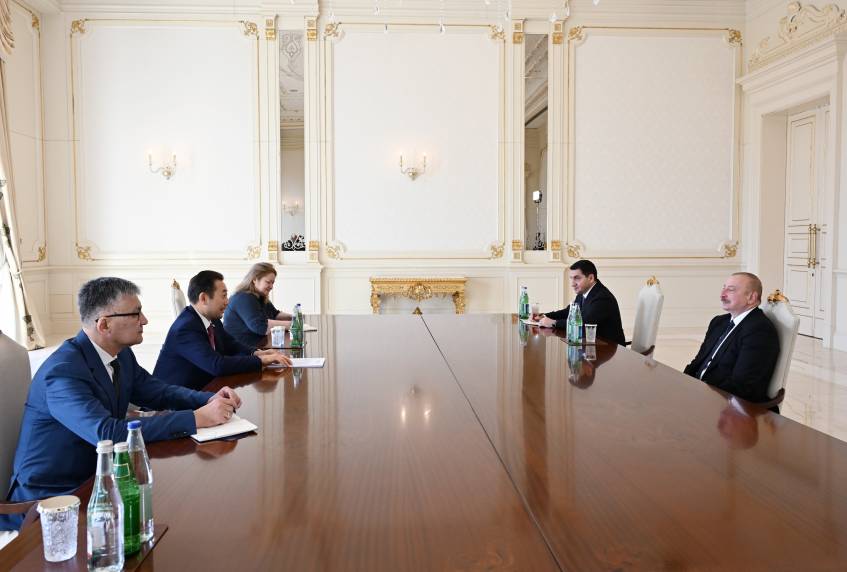
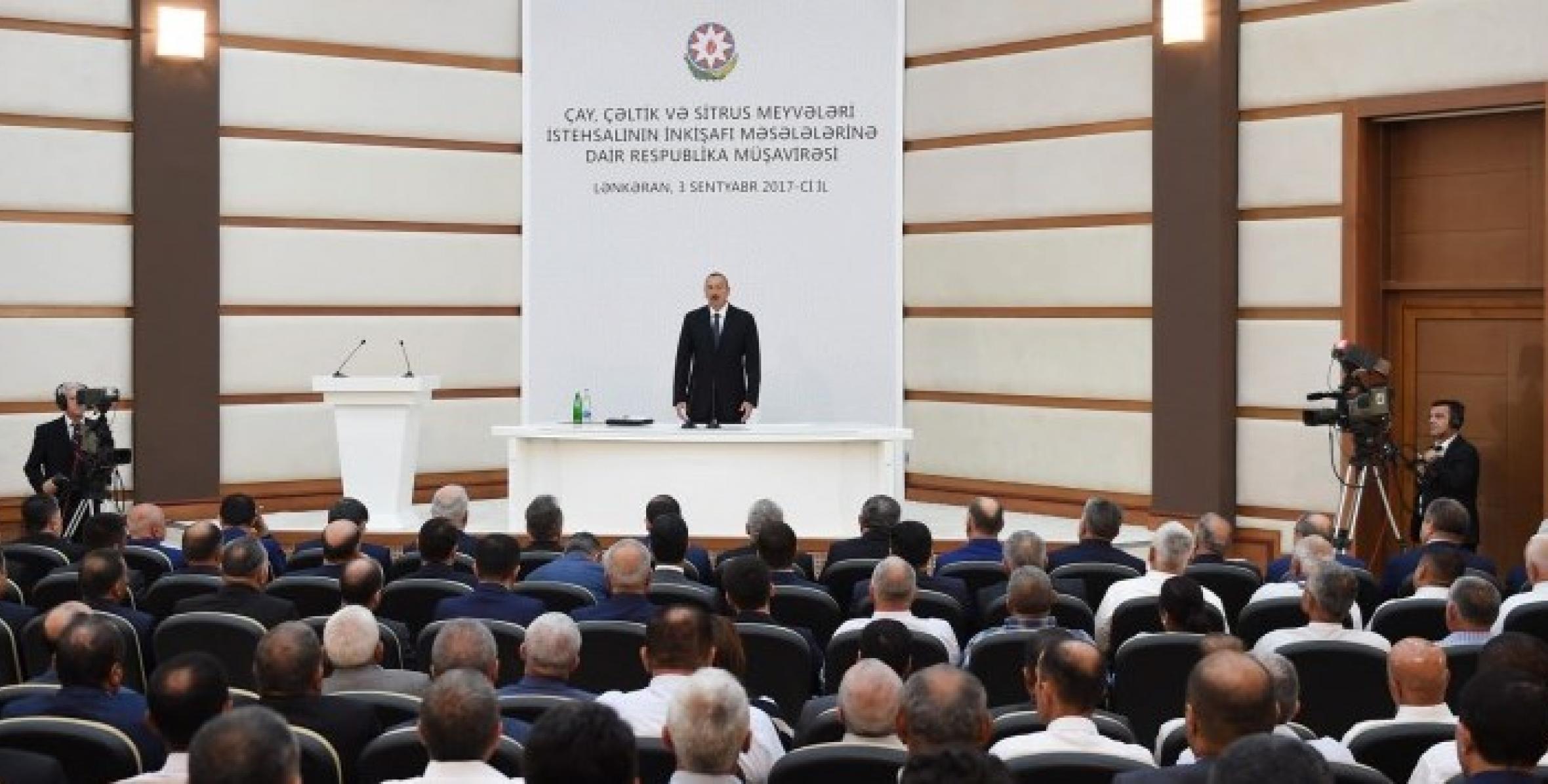
At today's meeting, we will discuss issues related to the development of the production of tea, rice and citrus in our country. I am glad that attention to these sectors has enhanced in recent years thanks to state support. This is very gratifying. In general, each branch of agriculture is very important for us, and the attention shown to this sphere in recent years is yielding fruit.
Of course, first of all we had to resolve the issue of food security, and very important steps have been taken in this direction. Along with this, we had to develop all traditional branches of agriculture. In fact, the main goal of the 2004 State Program on Socioeconomic Development of Regions was to develop them, implement infrastructure projects in the regions, create conditions for entrepreneurship and diversify the country's economic development. Today, we can say with full confidence that we have achieved these goals. There can be no development without the infrastructure. Therefore, the state programs on socioeconomic development of the regions adopted in 2004 and then in 2009 and 2014 were very specific. As a result of the implementation of those programs in all our regions, there was rapid development in every district, and this development continues today.
Over these years, we have laid the foundation for our economic development. When we started to implement the program, the infrastructure created in Azerbaijan earlier was already obsolete. We could not provide ourselves with electricity and gas, and relied on imports. Under such circumstances, there could be no talk of developing industry and agriculture. In the first place, we created the basis for development. In recent years, we have built more than 20 power plants. We not only provide ourselves now, but also export electricity to foreign countries.
Gasification in Azerbaijan was at a very low level. I remember coming to Lankaran District in 2000, on the eve of the parliamentary election. At that time, at meetings with local people, the issue of the lack of natural gas was raised most often. I remember those days. However, today about 90 per cent of Lankaran District has been gasified. Gasification in the country reached 93 per cent. In the coming years, gasification work will be continued in all our regions. We have started to export natural gas, and the currency so necessary for our country is now coming in.
In recent years, we have built more than 11,000 kilometers of roads. We also opened several road projects yesterday. These roads connect all the regions with each other. Work related to highways, main roads, roads creating a link with neighboring countries and with rural roads has gained great momentum. These are social and at the same time economic projects. The farmers and entrepreneurs are well aware that there can be no talks of development without roads. A good road gives a major impetus to the development of both agriculture and tourism. We saw this quite clearly today. In short, we created modern infrastructure in previous years to facilitate rapid economic development and so that we could develop further on this foundation.
In parallel, great attention has been paid to social infrastructure issues. Of course, this is also very important. I have always said this and want to note again that all our work and policies are centered on the people Azerbaijan. The people of Azerbaijan should live well, but there should be opportunities for that. Therefore, the solution of social problems, in particular, issues related to education and health, have always been a priority for us. Over the past few years, more than 3,000 schools and over 600 medical centers have been established, and today they are serving our people. At the same time, the conditions created in the regions also prevent migration to large cities. We already see that the migration from all the regions to Baku which was observed in previous years has now declined and the reverse process has started. People are returning from cities to villages, because excellent opportunities have been created for the development of agriculture.
I would like to note again that if we had not allocated large funds for infrastructure projects in good time, this development would not be so rapid now. In recent years, we have achieved a sharp reduction in unemployment in the country, and Azerbaijan is in one of the leading places in the world in this respect. Unemployment in Azerbaijan is at about 5 per cent, especially today, when there is such development and so much is being invested in agriculture. In the last two years, thousands of public jobs have been created, and whoever wants to work will find a job. The fact that we have created more than 1.6 million jobs is also a sign and manifestation of our policy.
Very important measures have been taken to facilitate the work of farmers and entrepreneurs. First of all, it was necessary to provide them with material resources. And we are doing that. In recent years, the state has provided entrepreneurs with concessional loans worth more than 2 billion manats, and entrepreneurs also invested their money, of course. As a result of this initiative, about 4 billion manats were invested in the real sector of the country's economy, perhaps even more. The loans are mainly allocated to the regions, to agriculture and the processing sector. Method guidelines are provided. I meet with entrepreneurs regularly and support them. You know that the number of inspections has sharply decreased. So we are creating conditions for entrepreneurs to work, create jobs, set up new industrial sites, so that Azerbaijan could increase production and exports and reduce imports. We are seeing that. In seven months of this year, the positive balance of our trade has significantly increased. In other words, we export more than we import. In seven months of the year, we managed to significantly increase our foreign exchange reserves. Although the price of oil is at a very low level today, in seven months we have increased our foreign exchange reserves by $3.6 billion. When I say that the country has no financial difficulties, these figures are a vivid example of this.
In other words, Azerbaijan has maintained a successful development dynamics in 2017, strengthened it and taken very important steps to diversify the economy. Thus, we are creating excellent conditions for future development.
The development of agriculture is a priority for us. I believe that no other country provides such support for those engaged in agriculture. First of all, if we look at the tax policy, we will see that farmers in our country are exempt from all taxes except for the land tax. Of course, this is great support provided to the farmers by the state. The state provides the most sophisticated equipment. When I was getting acquainted with farms yesterday, I saw the new equipment. Without this equipment, it is impossible to develop agriculture. This year, 10,000 units of the most advanced equipment have been delivered to Azerbaijan. Subsidies are provided to farmers. As I have already mentioned, loans are granted on preferential terms. Most of the fuel and fertilizer is provided by the state. Methodological recommendations are provided. Based on the recommendations provided by the state, about 40 modern agricultural estates are being created now. Entrepreneurs and farmers are provided with so much support, and we are seeing the result of that. Entrepreneurs and farmers treat this work responsibly and repay their loans on time. In the coming years, specific work will be done in all the branches of agriculture.
The Azerbaijani public knows that state programs on various branches of agriculture have been adopted in recent years. These are very specific programs. All instructions have been issued and funds allocated. As a result of these programs, we will achieve diversification in agriculture.
Of course, food security is one of the main issues for us. Very important steps have been taken in this direction in recent years. We developed non-traditional sectors for us. In previous years, during the Soviet period, we imported meat, milk and chicken meat from other republics. Today, there is great development in these sectors. Production of meat is provided by internal opportunities almost by 100 per cent. Chicken meat is also at 100 per cent – we are even exporting it. Eighty per cent of milk is produced domestically. As a result of the measures taken, we will reach 100 per cent.
We are also successfully developing traditional sectors now. Cotton-growing. We have restored the glory of cotton-growing. A lot of work was done in two years. Cotton fields have been increased from 17,000 hectares to 136,000 hectares. Two meetings were held in Sabirabad and Saatli. Tobacco growing, hazelnut farming and silkworm breeding are developing fast. A meeting was held in Gakh District and tobacco areas have been increased to 3,200 hectares. The area of hazelnut orchards has reached 55,000 hectares and will be brought to a further 80,000 hectares. Silkworm production has gained momentum in all the regions of our country. I reviewed mulberry seedlings in Lankaran yesterday. I see that there is a great interest in this sphere in Lankaran although sericulture did not develop in Lankaran and in this region in the Soviet period. The development of these sectors increases employment, reduces dependence on imports and strengthens our export potential. This is our goal.
At today's meeting, we will discuss the development of traditional branches – tea and rice growing. These branches have great traditions in Azerbaijan. At the same time, the traditional agricultural products of the southern zone are citrus fruits. Important steps have been taken in this direction in recent years. I am sure that this meeting will give a major impetus to the development of these three important sectors. After all, the state already provides serious support to these branches.
I should also note, as our experience shows, that agriculture can’t develop successfully without state support. The state takes all the necessary measures, invests funds, creates the infrastructure, provides technology and fertilizer, and organizes laboratories. Seed, veterinary and agrochemical laboratories are organized throughout the country. Method guidelines are provided. At the same time, the recently created procurement structure also helps farmers sell their products. Therefore, great attention is and will be paid to these three traditional sectors. I am confident that we will see even more rapid development in these sectors after this meeting.

Aleksandar Vučić, President of the Republic of Serbia, made a phone call to the President of the Republic of Azerbaijan Ilham Aliyev, on April 16, briefing him on the pressures Serbia has been encountering recently and requesting the support of the friendly...
16 April 2024, 20:36Dear Mr. Pellegrini,
I sincerely congratulate you on your election as the President of the Slovak Republic.
The development of friendly relations with Slovakia holds great significance for us. Currently, there are good opportunities for enriching the...
15 April 2024, 13:06Prime Minister Muhammad Shehbaz Sharif of the Islamic Republic of Pakistan made a phone call to President Ilham Aliyev of the Republic of Azerbaijan on April 9.
Pakistan's Prime Minister congratulated the head of state on the occasion of Eid al-Fitr and wished...
09 April 2024, 19:52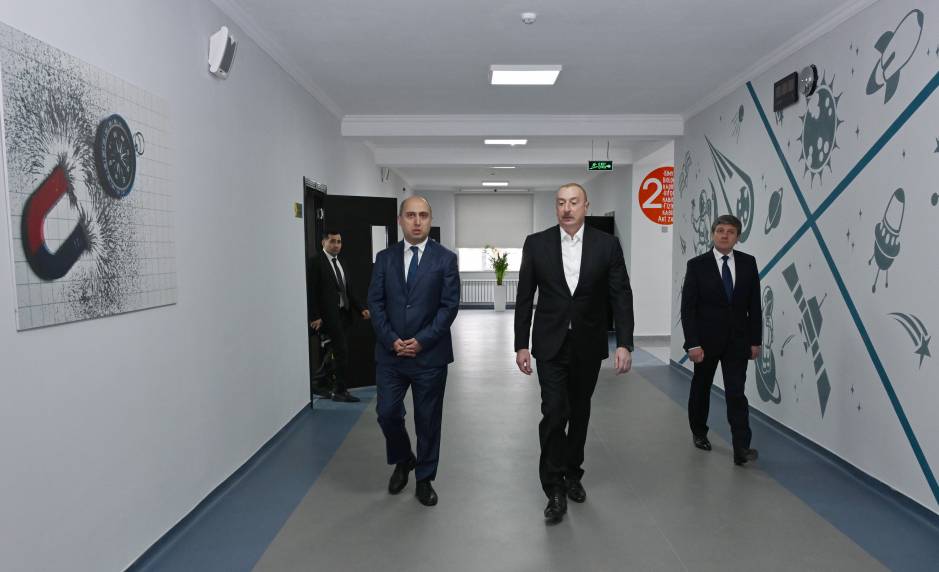
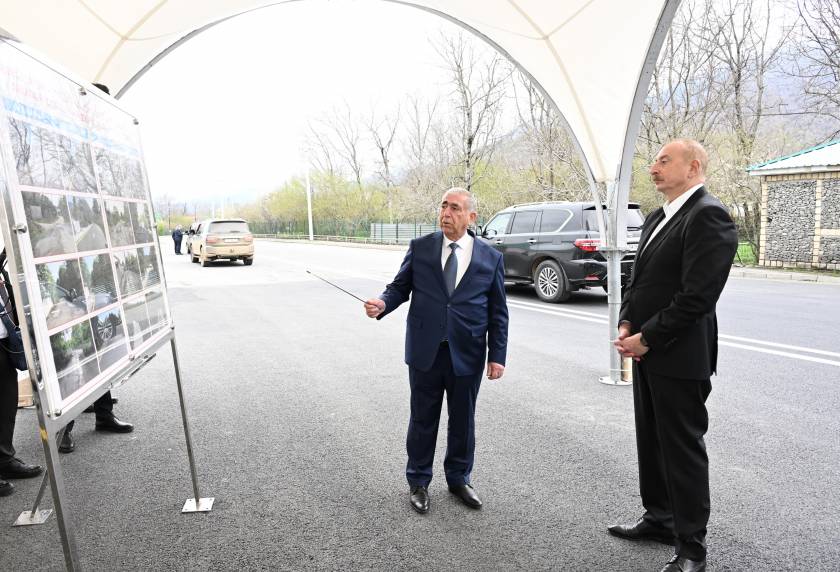
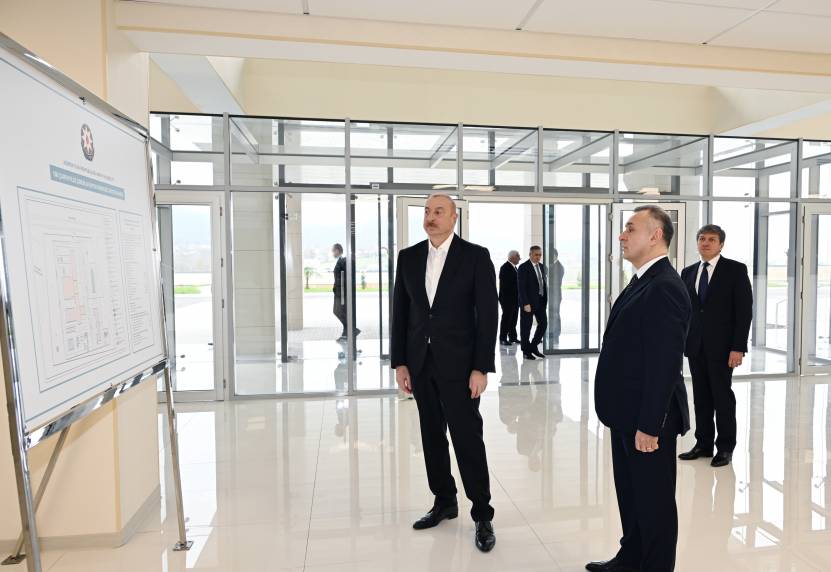
On April 9, President Recep Tayyip Erdogan of the Republic of Türkiye made a phone call to President Ilham Aliyev of the Republic of Azerbaijan.
The President of Türkiye congratulated President Ilham Aliyev on the occasion of Eid al-Fitr and wished the people of...
09 April 2024, 15:39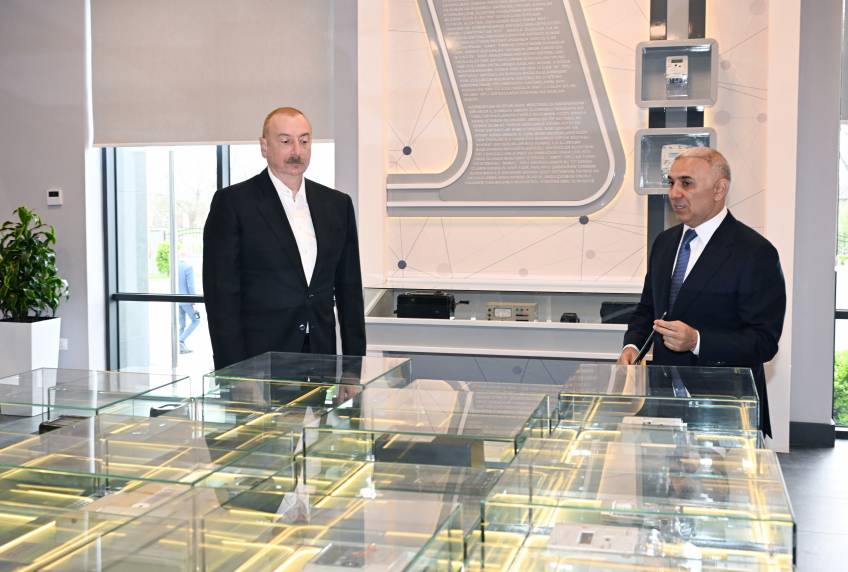
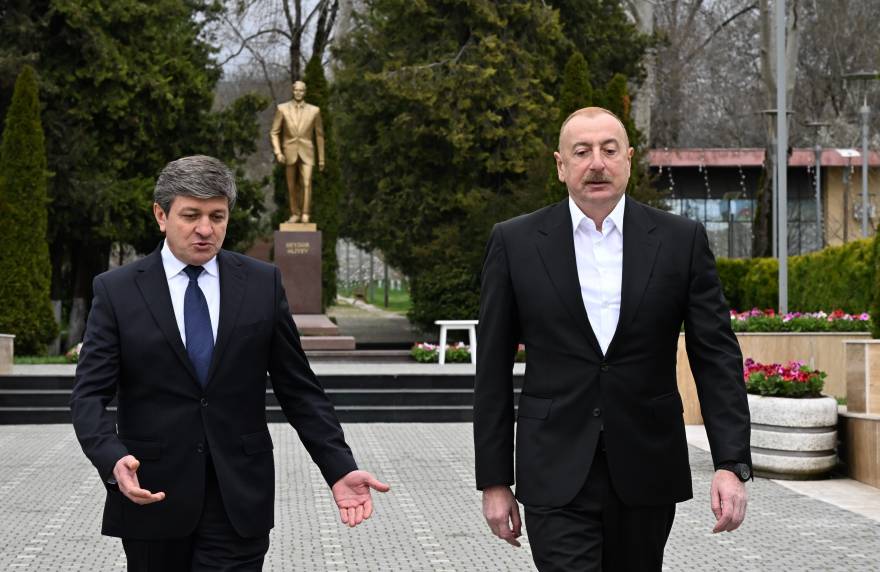
President of the Republic of Azerbaijan Ilham Aliyev has toured the Qabala district.
The head of state visited the monument to National Leader Heydar Aliyev erected in the city of Qabala and participated in the opening ceremonies of the 110/35/10 kV "Hajialili"...
09 April 2024, 15:14